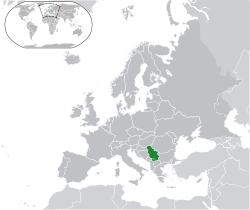Serbia: New Defense Minister Says ‘No’ To NATO
By Bojana Barlovac
The Serbian newly appointed defence minister has pledged that the country will keep the course of military neutrality.
In his first public address, Aleksandar Vucic, Serbian Defence Minister, said that there will be no changes in the country’s military or defence policy and that Serbia will remain military neutral.
“Our army will not be a member of any military alliance but we are a member of the Partnership for Peace program and we will establish cooperation within that partnership,” Vucic said.

Serbia became a Partnership for Peace, PfP, member in December 2006, signing a co-operation agreement with NATO in which democratic, institutional and defence reforms were key.
Prior to becoming a formal member, Serbia engaged in limited security and defence reform in co-operation with NATO, while military officers and civilians were allowed to participate in PfP courses.
A day after NATO accepted Albania and Croatia into the Alliance in April 2009, Serbia unveiled drafts of its national security and defence strategies, in which it maintains its proclaimed military neutrality.
According to a latest research, about 70 per cent Serbian nationals oppose the country’s NATO membership.
Vucic also said that the Serbian army had excellent cooperation with the US, but that the Ministry of Defence would continue cooperating with Russia as well.
The minister comes from the ranks of the Serbian Progressive Party, which emerged from the Radicals in 2008. The Serbian Radical Party is remembered for sending volunteers to the battlefields of the former Yugoslavia in the 1990s and militaristic statements of its leaders, including Vojislav Seselj, currently on trial for war crimes in The Hague.
According to Vucic, Serbia’s cooperation with other countries in the region is good and his goal is “peace and good cooperation.”
He announced staff changes in both the army and Ministry of Defence, and added that he and President Tomislav Nikolic were satisfied with how the chief of staff, General Ljubisa Dikovic, was doing his job.
“We are in no hurry to carry out staff changes because we want to acquaint ourselves with the situation and people first, but there will be some changes,” he said.
A report published at the start of the year by the Humanitarian Law Centre, a Belgrade based NGO, blamed numerous war crimes committed in Kosovo in 1999 on the then commander of the Motorised Brigade of the Yugoslav Army, JNA, today’s head of the Serbian Army Ljubisa Dikovic.
Both the Ministry of Defence and General Dikovic have denounced the report as a vicious attempt to smear the Army’s reputation.
